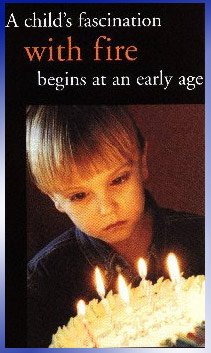
TAPP-C is an intervention program to reduce fire involvement (intentional firesetting and/or match/lighter play) and to promote fire safety among children aged 2-17 years.
Over half of all known incendiary fires in Ontario are motivated largely by mischief and vandalism. Of these fires, the majority are set by children. Firesetting is extremely dangerous behaviour with potentially grave consequences. Unsupervised fire involvement puts children and their families at risk of serious injury or death. TAPP-C is one of the most effective programs available to a community to address juvenile firesetting.
TAPP-C is a collaborative intervention program that is delivered by both the fire service and mental health professionals in the community.
It is based on the premise that this activity is best addressed through a combination of fire safety education and appropriate mental health service. It is family-based in design so that all family members benefit from participation.
Children involved with fire are referred to the program by parents or caregivers, local fire or police departments, schools, mental health centres, probation offices, crown attorneys, judges or any other concerned individuals or agencies.
Once a child is referred to the program, the local participating fire department will schedule a TAPP-C Home Fire Safety Check and fire safety education sessions with the child and family. The child will also be referred to a local mental health professional for assessment. The child will be assessed using a protocol developed specifically by the Clarke for TAPP-C. This assessment is intended to determine why a particular child is involved in firesetting and whether mental health treatment is required.
How does TAPP-C work?
The program begins with the TAPP-C Fire Safety Education component, designed to create an awareness of the dangers associated with firesetting and to instill children with a sense of responsibility for their actions. It consists of four age-specific sessions, the first of which is the Home Fire Safety Check. This check is conducted by specially trained members of the fire departments to ensure that there are working smoke alarms in the home, that matches/lighters are not accessible to children, and that escape routes are planned and practiced. By making the home more fire-safe, the potential risk for children and their families is reduced. The other two educational sessions, which teach basic fire safety, are usually held at the local fire station. Parents/caregivers are encouraged to attend these education sessions with the child.
The program continues with the TAPP-C assessment protocol which evaluates a child's risk of further firesetting and the risk of future injury/fatality. Once assessed, children, together with their families, are provided with the appropriated treatment.
It is important to understand that TAPP-C differs from most other juvenile fire setting programs in that the risk assessment is conducted by mental health professionals and not by the fire service. Fire involvement is often a symptom of an underlying mental health problem and needs to be investigated as such. The failure to detect and treat such a disturbance can have very serious consequences.
Funding for the program comes from the Fire Marshal's Public Fire Safety Council and allows the Clarke Institute of Psychiatry to continue ongoing research into juvenile firesetting.
TO SUBMIT A TAPP-C REFERRAL PLEASE CONTACT OUR FIRE & LIFE SAFETY EDUCATOR, Jennifer Baker at 905-953-5129, option 3, x3024.